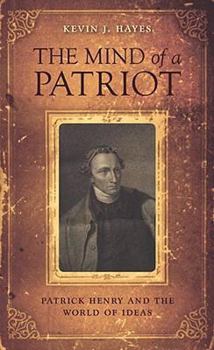The Mind of a Patriot: Patrick Henry and the World of Ideas
Select Format
Select Condition 
Book Overview
The Mind of a Patriot presents an intellectual life of a major figure who has traditionally been seen as an anti-intellectual "child of nature." This was the view of Patrick Henry that William Wirt presented in his Life of Henry, and it has pervaded every biography since. Hayes presents a very different view of Henry. Starting with neglected pieces of evidence-the inventory of Henry's library-Hayes's unique perspective allows him...
Format:Hardcover
Language:English
ISBN:0813927587
ISBN13:9780813927589
Release Date:October 2008
Publisher:University of Virginia Press
Length:200 Pages
Weight:0.95 lbs.
Dimensions:0.8" x 6.1" x 9.2"
Age Range:18 years and up
Grade Range:Postsecondary and higher
Customer Reviews
2 ratings
" '...every other man's library is an object of curiosity....' "
Published by Thriftbooks.com User , 15 years ago
The Mind of a Patriot: Patrick Henry and the World of Ideas, on page 91, quotes Walter Besant further about the habits (or at least inclinations) of bibliophiles: " 'The lover of books may be distinguished by one trick he has which betrayeth him. If he is in a strange house he makes straight for the shelves: before anything else he hastens to take stock of the library.' " Judge Spencer Roane, who evidently was an avid book lover, got his chance to do just that when he lodged with Patrick Henry and his family. The judge "observed: 'As for the general character of Mr. Henry's library, I readily believe that he had not a complete of regular one....I...saw his library fully. I remarked that it consisted sometimes of odd volumes...but good books.' " Kevin J. Hayes, a professor of English, explores that library. Or more correctly, he explores the books catalogued as a part of Patrick Henry's estate inventory. Henry's library wasn't extensive, but the fiery patriot known for his "give me liberty or give me death" speech, probably owned more at various times during his life, so the 188 books listed in the appendix also include some volumes that weren't present after Henry's death in 1799 but for which "sufficient evidence survives to justify their inclusion." Among the listed titles were various Latin and Greek primers and classics, manuals and texts for the study and practice of the law, various political theory and history books including ones discussing forms of government and the moral and economic problems of slavery, English and rhetoric books including dictionaries, a few novels, and some travel books. Works by Homer, Pope, Shakespeare, Swift, Demosthenes, and DeFoe are represented. Hayes provides solid suppositions for how these books helped form and support Henry's continuing studies and his views on freedom and rights, among other things. Hayes use of Henry's library to defend him on a number of issues meets with varying degrees of success. But on the matter of slavery, no attempt at mitigation is expected or made. Apparently for economic reasons, Henry never freed his own slaves, despite recognizing the inhumanity of the "institution," and that fact is simply acknowledged. Hayes' first of seven chapters deals with how Henry's contemporaries perceived him. In particular, how Thomas Jefferson did. Jefferson, whom Henry opposed concerning the adoption of the federal constitution, "generally praised Henry's oratory yet critiqued his learning." Others also portrayed Henry as a man who relied more on intuition than logic and scholarship. Early Henry biography William Wirt was one, relying considerably on Jefferson's opinion. In part these assessments were based on Henry's relatively small library. Jefferson who famously said, "I cannot live without books," amassed thousands in his own library and apparently thought Henry's collection the mark of a man who wasn't very educated. But Hayes points out, "To men like Thomas Jefferson or Benjamin Frank
Son of Thunder
Published by Thriftbooks.com User , 16 years ago
Here, Kevin J. Hayes focuses on the books that formed the small library of Patrick Henry. This short but useful effort does not attempt to be a biography of the great orator of the Revolution, but its reading will help one understand the type of person Patrick Henry was and the intellectual influences that shaped him as a young attorney and beyond. Those who enjoy this book would certainly also enjoy another of Professor Hayes' books: "The Road to Monticello: The Life and Mind of Thomas Jefferson." As an aside, I think April Leidig-Higgins did a fine job designing the book's dust jacket.





